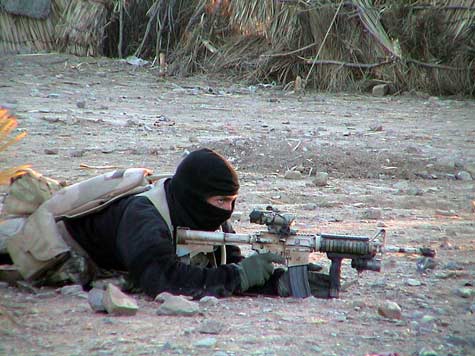
A Navy SEAL in Afghanistan |
JACK REED
NATIONAL SECURITY
Rhode Island Senator Jack Reed, a former Army Ranger, has emerged as one of Washington's leading voices on national security issues — and a key adviser to the Obama Administration.
OSAMA BIN LADEN IS DEAD NOW. WE'VE KILLED SEVERAL NUMBER TWOS. WHAT'S NEXT? The continuous attrition and pre-emption of Al Qaeda elements. They tend to gravitate to ungoverned areas, unstable areas, where they can operate. And so we have to have a virtual presence there — intelligence operations there. Places like Yemen, places like Somalia.
What we've learned — difficult lesson — is that this operation against terrorism is as much an intelligence and special forces operation. Much more so than conventional forces.
GENERAL DAVID PATREAUS HAS RETIRED FROM THE MILITARY AND IS TRANSITIONING TO THE CIA. AND THAT SPEAKS, AS WELL AS ANYTHING, TO THE BLURRING OF THE LINES BETWEEN THE MILITARY AND THE INTELLIGENCE COMMUNITY SINCE 9/11. IS THAT AN ENTIRELY GOOD THING? One of the positive results of 9/11 has been the sharing of information — the sharing of intelligence — so that analysts aren't stovepiped.
But I think there was a danger, frankly, under the Bush Administration for this sort of blurring — where everyone operates under their own sort of made-up rules. We've tried very much to correct that, by insisting, for example, that all interrogations by military personnel be subject to the Army Field Manual — that there's no longer the opportunity to improvise and say, "Well, I saw those CIA guys, their contractors, doing this, I can do this." No.
This is what happened, really, in Abu Ghraib.
GENERAL PATREAUS, IN RETIRING, WARNED THAT PROPOSED BUDGET CUTS COULD EAT AWAY AT WHAT HE CALLED THE MILITARY'S "FULL SPECTRUM" OF CAPABILITIES. DO WE TRULY NEED THAT "FULL SPECTRUM" OR ARE WE IN A FUNDAMENTALLY DIFFERENT ERA? I think we have to look at all the different government programs, particularly in a time of significant deficit. We have to ensure, first, that we protect our forces in the field, second, that we are still looking ahead — not just five months ahead, but five years ahead to potential threats to the United States. And that's going to be the very difficult challenge that [new Secretary of Defense Leon] Panetta has, because this is not 2000-2001, when we were looking at a significant surplus.
TEN YEARS FROM NOW, DO YOU THINK WE'LL BE RECALLING ANOTHER MAJOR TERRORIST ATTACK ON AMERICAN SOIL? I think you always have to consider that possibility. We grew up in a Cold War, state-on-state, big systems [world]. We could hold their cities at risk, they could hold our cities at risk. We were checked. Now we're dealing with different [enemies]. Some of them have nothing at risk. They're fanatics. They have nothing to protect.